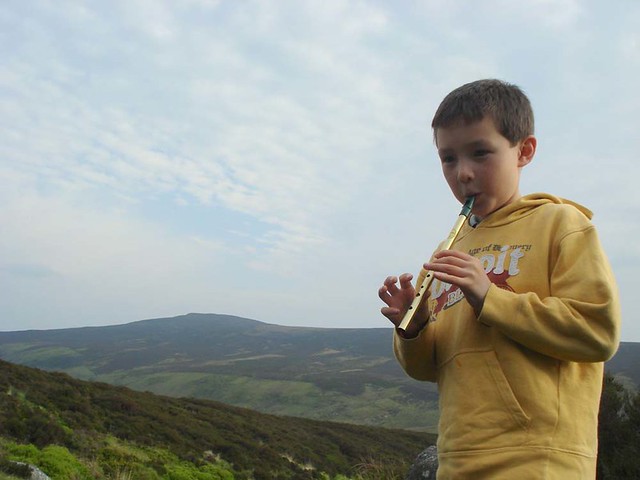 |
| Photo by IvanWalsh.com |
The tin whistle is a simple instrument -- and it's simple to play, and simple to play easy tunes. But -- it's not simple to master! The instrument may be cheap, but you'll have to pay for mastery ... by practicing! The haunting whistle tunes from the movie "Titanic" illustrate the deep soul found in this instrument.
This instrument is commonly made from metal (usually brass) with a molded whistle mouthpiece. By playing it open (not covering any of the six fingerholes), then by covering each finger hole, in turn, you can play the 7 notes in a diatonic (a simple Do-Re-Mi scale -- essentially the white keys on a piano) scale. Blow a little bit harder and you'll play the same note, but an octave higher. While it is a diatonic instrument, you can achieve sharps and flats by half-covering fingerholes.
Since there are essentially only two open notes -- a note, then the note an octave higher when you blow harder -- each tin whistle is said to represent a certain Key signature. For instance, if the open note sounds a "D", then the whistle is considered to be in the key of D. Many players carry a small set of whistles in the most commonly used keys.
Some people don't realize you can actually tune a tin whistle! You do so by sliding the metal barrel of the whistle in and out of the mouthpiece head. Some whistles have the head glues securely to the barrel. You can usually loosen the glue by holding the joined portion under hot running water. Don't use boiling water -- this may melt the plastic whistle head!
Key signatures commonly found in Celtic Music are "D Major" and "G Major". By default, all tin whistles are in a Major key (since they play a diatonic scale). However, if you begin your scale with all the finger holes covered (instead of all fingerholes open), then you're beginning one step higher than a diatonic scale -- which results in a minor key signature! For instance, a tin whistle in "D" can play in E Minor if you begin your scale by covering all the fingerholes. Interestingly enough, the chord sequence "E Minor" and "D Major" is commonly found in Celtic Music. (This is the same chord sequence used in "What Would You Do with A Drunken Sailor".) A whistle in "G Major" could easily play in A Minor (A Minor and G being another commonly found chord sequence).
Article Directory: EzineArticles |

